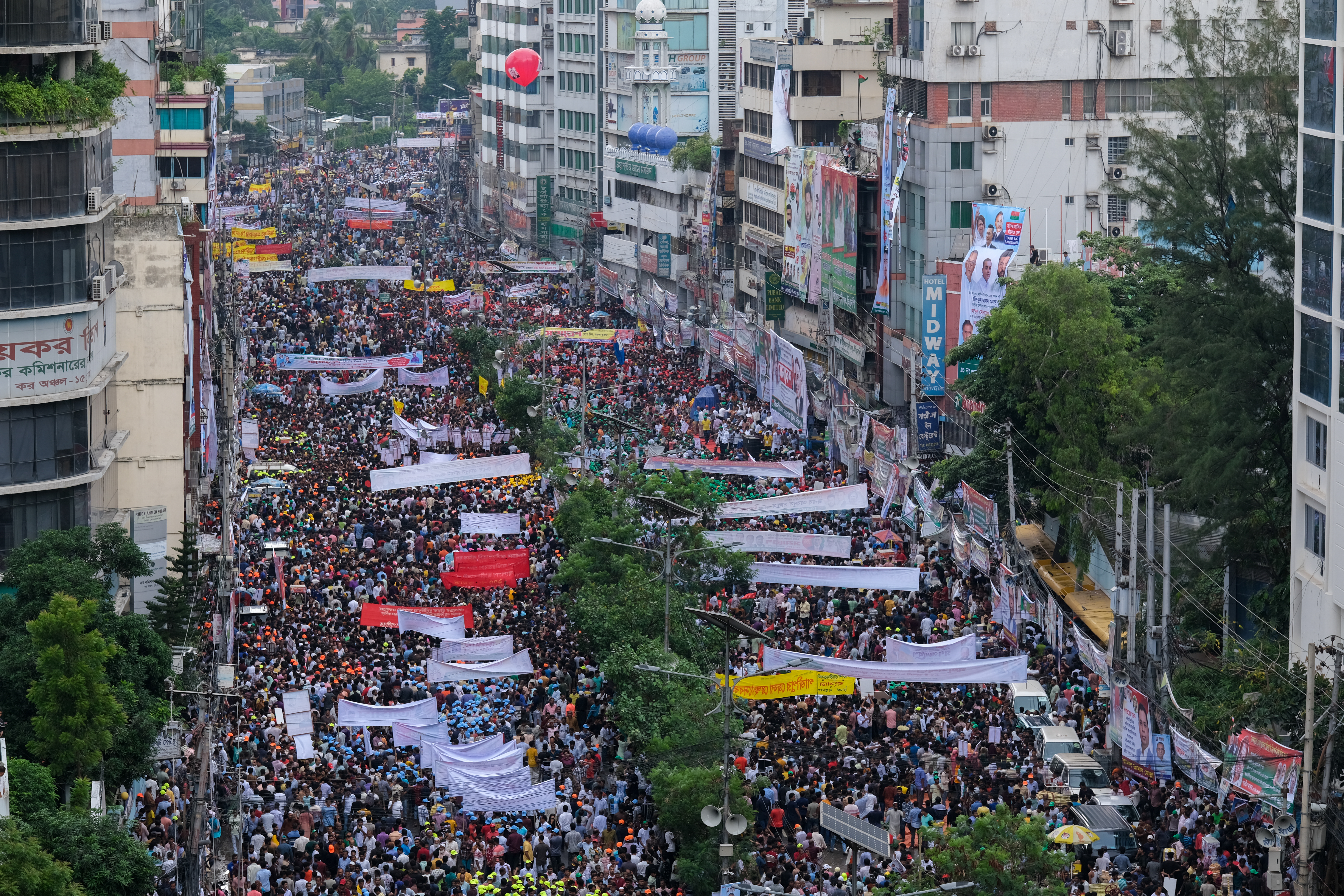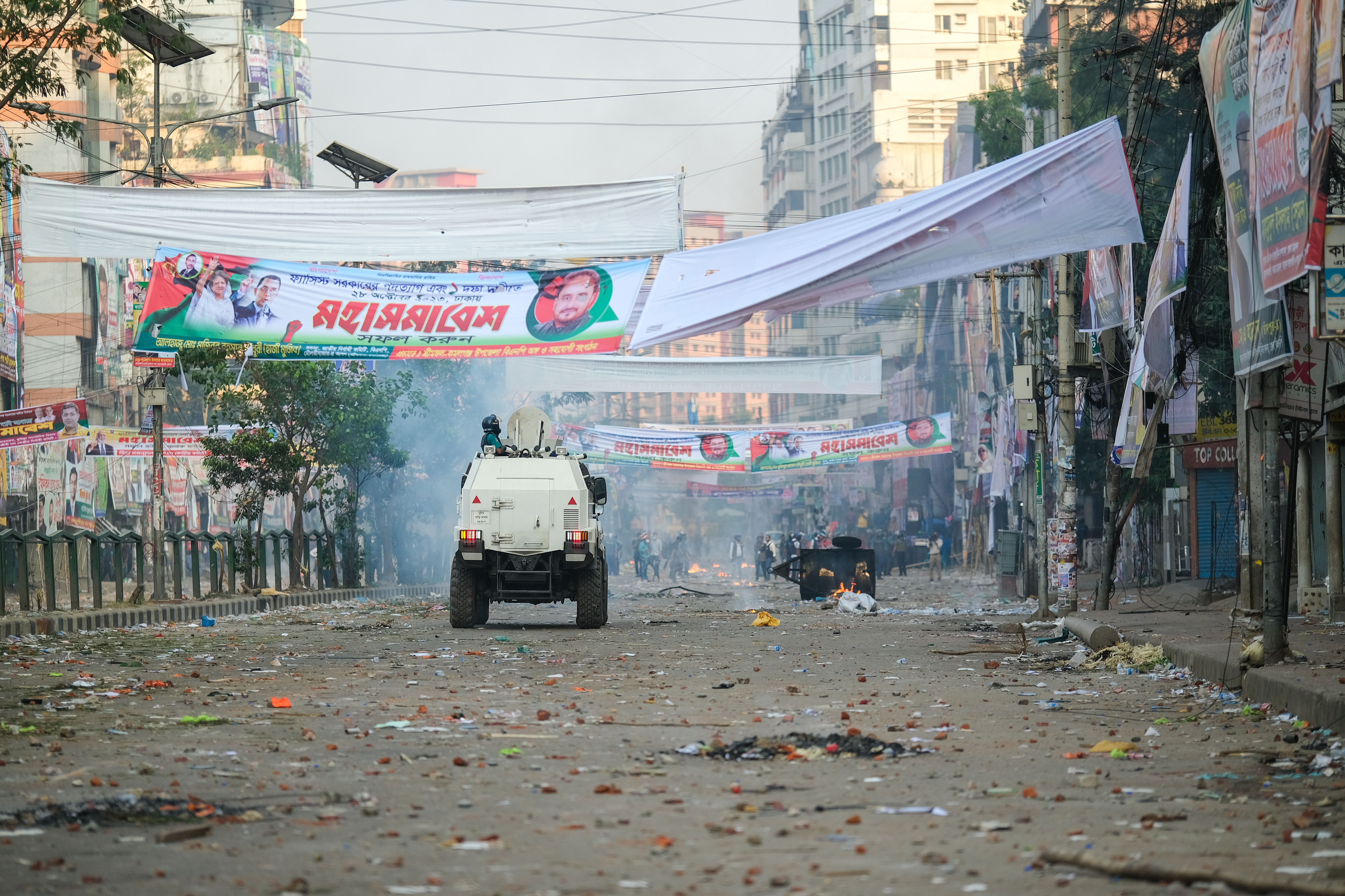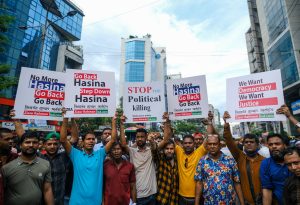In November last year, Iqbal Hasan Mahmud Tuku, a standing committee member of the Bangladesh Nationalist Party (BNP), asserted in an interview with an Indian daily, The Hindu, that the BNP is a secular party. He continued: “At one point, we had an alliance with the Jamaat [Bangladesh Jamaat-e-Islami] just the way political coalitions take place in democracies like India. That is now in the past.”
However, following this statement, Ruhul Kabir Rizvi, the senior joint secretary-general of the party, contradicted it, claiming that the BNP’s stance differs.
“Recently, the party’s national standing committee member Tuku discussed secularism, political Islam, and Bangladesh Jamaat-e-Islami,” Rizvi said, emphasizing that the expressed views, statements, and opinions are Tuku’s personal and have no association with the party itself.
The BNP-led 20-party alliance, which included Jamaat-e-Islami (JI), dissolved in December 2022 following the BNP’s decision to sever ties and formalize the end of relations with the JI. This alliance, initially formed in 1999, won the 2001 national election as a four-party coalition. Over time, it expanded to a 20-party alliance in 2012 but remained largely inactive since the 2018 election amid allegations of vote rigging.
The BNP had distanced itself from the JI due to widespread criticism for aligning with a party that opposed Bangladesh’s liberation in the 1971 war.
However, the BNP didn’t keep its distance even for a year. According to The Daily Star, a national daily of Bangladesh, before the Nayapaltan rally on October 28, 2023, BNP leaders reportedly reached out to Jamaat leaders to repair relations and jointly pressure the ruling Awami League to meet the BNP’s demand for elections under a neutral caretaker government.
Tarique Rahman, the BNP’s acting chairperson who has been in exile in London since 2007, also communicated with top Jamaat leaders leading up to the rally. Following this, starting from October 31, the JI actively supported the BNP’s protest programs by enforcing nationwide blockades in tandem with the BNP.
It is evident that there are internal disagreements among the party leaders regarding the BNP’s relationship with the JI specially, and with political Islam more generally. Hence, the question arises: Why did Tuku make such a statement?
It’s important to note the context of Tuku’s statement: an interview with a major Indian daily. It may be that Tuku had recognized that securing New Delhi’s backing was a necessary prerequisite for gaining Washington’s support. External pressure on the Awami League government was a crucial part of the opposition plan to secure a free and fair election. If this was Tuku’s calculation, it appears he assumed that the pursuit of New Delhi’s support entailed the transformation of the BNP into a secular entity, thereby reducing its affiliation with the JI.

Thousands crowd the streets during a BNP rally on July 12, 2023.
The context of these internal rifts is further highlighted by the BNP’s past electoral performance. In the 2008 national election, the BNP suffered a significant defeat against the Awami League (AL), securing only 30 seats while the AL clinched 230 seats, and the coalition of other parties won 27 seats.
Since then, the AL has maintained its hold on power. The BNP chose to boycott the 2014 election, accusing the AL of election-rigging and demanding an election under a neutral caretaker government. The BNP participated in the 2018 polls for the sake of maintaining registration; however that election was also not held under a caretaker government and the BNP faced a resounding defeat against the AL amid widespread reports of voting irregularities.
In the most recent election on January 7, 2024, the AL emerged victorious once again in a poll widely dismissed by pro-democracy groups as deeply flawed.
The repeated electoral challenges and criticisms from rights groups abroad have led to Bangladesh being labeled as an autocratic and one-party state.
The AL had changed Bangladesh’s constitution to scrap the caretaker government system, and reject any demands from the BNP to resume the practice. That’s why from the middle of 2023, the United States and European Union authorities started to put pressure on Prime Minister Sheikh Hasina to fulfill the opposition parties’ demand for free and fair elections.
Representatives from these nations engaged with both opposition and ruling AL leaders to discuss ensuring “free, fair, and participatory elections.” Numerous discussions were held with the Bangladesh Election Commission regarding the 2024 national election.
During these meetings, the BNP explicitly declared its intent to boycott the elections if their demand for supervision by a caretaker government wasn’t fulfilled. However, AL leaders firmly conveyed to the envoys that the opposition’s demand would not be accommodated, citing the abolition of the caretaker government system through the 15th constitutional amendment in 2011.
According to Swarajya, an Indian media outlet, Dhaka, under growing pressure from Western capitals, sought assistance from New Delhi. It was reported that Hasina personally engaged with Indian Prime Minister Narendra Modi, and diplomatic discussions ensued between the two nations. Despite maintaining that Bangladesh’s elections are an internal matter, India is said to have assured Dhaka of its support for the AL leadership.
A number of senior officials at the Ministry of External Affairs of India told Swarajya that India explained the political scenario in Bangladesh to the Western nations – and, in particular, elaborated on the links between the BNP and radical Islamist forces.
As one Indian official explained to The Hindustan Times recently:
If Hasina fell, it means BNP was back. If BNP was back, it meant Jamaat was back. If Jamaat was back, it meant ISI [Pakistan’s intelligence agency] was back. If ISI was back, it meant China’s security presence was even more intense. And if Dhaka had a government that was internally reliant on Islamists and externally reliant on Pakistan, it meant that our Northeast was even more fragile. It is a no-brainer that we would support Awami.

Security forces patrol after the BNP’s rally on Oct. 28 2023.
Can Secularism Help the BNP?
From the comments of Indian officials, it’s clear that one of New Delhi’s problems with the BNP is it has close ties with Islamic political parties, particularly with the JI, which is a pro-Pakistan party – to the extent of taking Islamabad’s side during the Liberation War in 1971. And if the BNP wants to ensure Western support, they need to ensure New Delhi’s support first.
“India of course has much clout in Bangladesh, given the geographical position and the economic collaboration. If India were to decide to close the borders, it would have a tremendous impact on Bangladesh. At the same time, the notion that India heavily influences politics in Bangladesh is exaggerated,” Arild Engelsen Ruud, a professor of South Asia studies at Oslo University, told The Diplomat.
“For the moment, and for good reason, the U.S. seems willing to let its Bangladesh policies be dictated by Delhi,” Ruud continued. “The reason is that Delhi is more important to Washington than Dhaka. In the great geopolitical shift that the world is going through, the U.S. wants India on its side.
“India’s word on Bangladesh to the U.S. can be taken as the last word, so it’s inevitable to earn Delhi’s support first,” he concluded.
Given the importance of the BNP’s relationship with political Islamism in this geopolitical context, it’s worthwhile to delve into the party’s position on secularism. Following Bangladesh’s liberation from Pakistan on December 16, 1971, the country took a year to formulate and make effective the new constitution, on December 16, 1972. This constitution embraced secularism as one of the four fundamental principles of the state, alongside nationalism, socialism, and democracy.
However, the trajectory shifted after the assassination of Bangabandhu Sheikh Mujibur Rahman, the country’s founding father, and the subsequent ascent of Ziaur Rahman to the presidency two years later, on April 21, 1977. In 1978, Rahman founded the BNP with the aim of championing Bangladeshi nationalism, democracy, and a liberal economic system.
In the meantime in 1977, Rahman removed the principles of socialism and secularism from the constitution, replacing them with the invocation of “absolute trust and faith in the Almighty Allah.” He also abolished the ban on all political parties, including religious politics, leading to the reconstitution of the Islamist party Jamaat-e-Islami.
Furthermore, Rahman and his BNP coined the concept of Bangladeshi nationalism that emphasizes the Muslim characteristics of the nation. This differs from the AL’s Bengali nationalism, which builds on the country’s ethno-linguistic identity.
In 1988, the military regime of General Hussain Muhammad Ershad, who founded the Jatiya Party (JP), made Islam the state religion. Both Rahman and Ershad relied on religious rhetoric, promoted the building of mosques, and allowed conservative madrasas and Islamic welfare associations to grow and receive funding from the Middle East.
Rahman’s alliance with the United States (which at that time was aligned with Pakistan over India) and the Arab countries also brought him closer to the Islamist forces in Bangladesh, especially the JI. The JI became a key ally of the BNP and joined its coalition governments in 1991 and 2001. The BNP-JI alliance pursued a pro-Islamic agenda that eroded the secular fabric of the society and the state.
It also antagonized India, which had supported Bangladesh’s Liberation War and considered secularism as a core value of its own constitution.
“India projects the BNP as a dangerous Islamist force that could pose major threats to New Delhi’s interests if it were to hold power,” explained Michael Kugelman, director of the Wilson Center’s South Asia Institute. “This projection is rooted in part in the BNP’s historic ties with entities like the JI. India contrasts this projection of the BNP with that of the AL, which New Delhi views as a more moderate and secular party.”
Kugelman added, “To be sure, this characterization overlooks how the AL has at times appeased Islamist actors, including the Hefazat-e-Islam, for political reasons.”
The BNP-JI alliance also faced allegations of human rights violations, corruption, and involvement in terrorist activities. India in particular remembers – and resents – previous BNP government officials’ alleged involvement in supplying arms to India-based separatist outfits like the United Liberation Front of Asom (ULFA).
The AL emerged as the main opposition to the BNP-JI coalition. The AL promised to restore secularism, democracy, and the rule of law in Bangladesh. It also sought to improve the relations with India, which had deteriorated under the BNP-JI rule.
After the AL’s landslide victory in the 2008 poll, Hasina initiated a series of reforms to strengthen the secular character of the state and the society. She repealed the 5th amendment and reinstated secularism in 2011 as one of the fundamental principles of the constitution. She also set up special tribunals to try the war criminals of 1971, many of whom belonged to the JI. She also cracked down on the Islamist militant groups that had proliferated under the BNP-JI regime.
Hasina forged a strategic partnership with India, resolving long-standing disputes over borders, water-sharing, trade, and transit. She also cooperated with India in combating terrorism and extremism in the region, including cracking down on anti-India militant groups that had sought refuge on Bangladeshi soil.
India, in turn, supported Hasina’s development agenda and provided assistance in various sectors, such as energy, infrastructure, health, and education. Bangladesh-India relations reached a new height under Hasina’s leadership.
With that history in mind, the potential for the BNP to win New Delhi’s trust is limited. “Becoming a secular party might help, but not automatically,” said Ruud. “The BNP would still be hampered by its own lack of strategic or electoral success, and its lack of interesting policies. Besides, Jamaat is not as unitary as it wants to portray itself but a party pointing in different directions.”
Kugelman also sees continued difficulties for the BNP, regardless of its approach to the JI. “Given how close the BJP [India’s ruling party] is to the AL and the comfort level at play, and given as well that the BNP has sought to distance itself from the JI in recent years, I’m not sure that the BNP undertaking an ideological transformation would make it more palatable to India – though it certainly wouldn’t hurt its prospects for reducing some of New Delhi’s suspicions,” he said.
“…If the BNP were to undertake such a dramatic change, it could risk alienating large portions of its support base, and some of its key political allies. And the party would presumably not be willing to make those sacrifices just for the sake of winning over India,” Kugelman added.
Many analysts suggested that the BNP’s political strategy rested on the United States and other liberal democracies successfully pressuring Hasina to hold free and fair elections. If so, this strategy was misplaced; in the end, the U.S. concern for democracy appeared to be outweighed by its security interests, particularly the need to respect Indian concerns regarding pressure on Hasina.
But others argue that the BNP never intended to rely on external support.
“I believe neither the U.S. nor India matter much in Bangladesh,” Mubashar Hasan, a Sydney-based scholar and analyst of geopolitics in South Asia, told The Diplomat. “It is up to the people of Bangladesh what they want and eventually it is the people of Bangladesh who will decide who they want in power, what sort of system they want to live under – the current autocracy or democracy.”
































